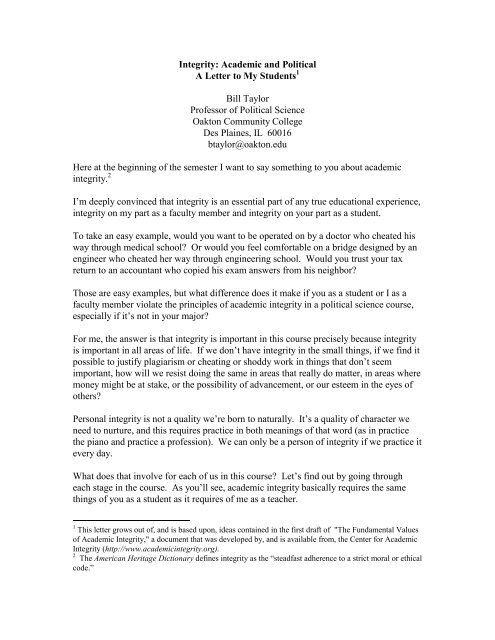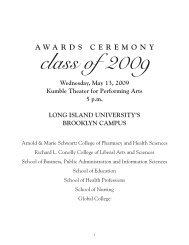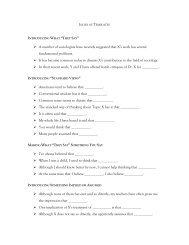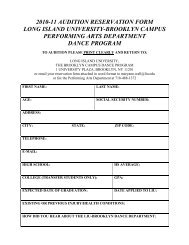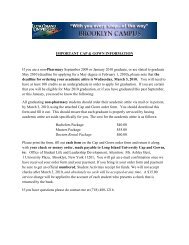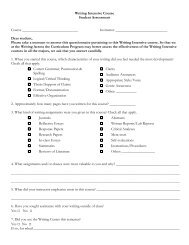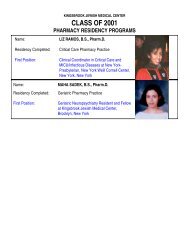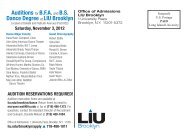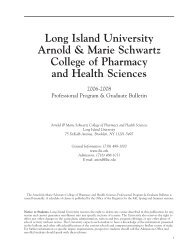The Bill Taylor Letter
The Bill Taylor Letter
The Bill Taylor Letter
Create successful ePaper yourself
Turn your PDF publications into a flip-book with our unique Google optimized e-Paper software.
Integrity: Academic and PoliticalA <strong>Letter</strong> to My Students 1<strong>Bill</strong> <strong>Taylor</strong>Professor of Political ScienceOakton Community CollegeDes Plaines, IL 60016btaylor@oakton.eduHere at the beginning of the semester I want to say something to you about academicintegrity. 2I’m deeply convinced that integrity is an essential part of any true educational experience,integrity on my part as a faculty member and integrity on your part as a student.To take an easy example, would you want to be operated on by a doctor who cheated hisway through medical school? Or would you feel comfortable on a bridge designed by anengineer who cheated her way through engineering school. Would you trust your taxreturn to an accountant who copied his exam answers from his neighbor?Those are easy examples, but what difference does it make if you as a student or I as afaculty member violate the principles of academic integrity in a political science course,especially if it’s not in your major?For me, the answer is that integrity is important in this course precisely because integrityis important in all areas of life. If we don’t have integrity in the small things, if we find itpossible to justify plagiarism or cheating or shoddy work in things that don’t seemimportant, how will we resist doing the same in areas that really do matter, in areas wheremoney might be at stake, or the possibility of advancement, or our esteem in the eyes ofothers?Personal integrity is not a quality we’re born to naturally. It’s a quality of character weneed to nurture, and this requires practice in both meanings of that word (as in practicethe piano and practice a profession). We can only be a person of integrity if we practice itevery day.What does that involve for each of us in this course? Let’s find out by going througheach stage in the course. As you’ll see, academic integrity basically requires the samethings of you as a student as it requires of me as a teacher.1 This letter grows out of, and is based upon, ideas contained in the first draft of "<strong>The</strong> Fundamental Valuesof Academic Integrity," a document that was developed by, and is available from, the Center for AcademicIntegrity (http://www.academicintegrity.org).2 <strong>The</strong> American Heritage Dictionary defines integrity as the “steadfast adherence to a strict moral or ethicalcode.”
• not allow others to ridicule you or your ideas, or you to do the same to them, and• make clear when I am expressing an opinion, and not impose on you my views oncontroversial issues.What Academic Integrity Requires of You in This AreaWith regard to class sessions, the principles of academic integrity require you to take bothme and your fellow students seriously and to treat us with respect. This requires that you:• show up for all class sessions, unless you are simply unable to do so,• come to class on time and not leave early,• make good use of class time by being engaged in what’s going on,• ask questions about anything you don’t understand, and not just for your own sake butbecause other students might not realize that they also don’t understand,• participate in the class discussions so as to contribute your thinking to the shared effortto develop understanding and insight (remember that even something that’s clearlywrong can contribute to the discussion by stimulating an idea in another student thats/he might not otherwise have had),• monitor your own participation so as to allow for and encourage the participation ofothers,• respect the other students by not making fun of them or their ideas, and by not holdingside-conversations that distract them (and me) from the class discussion.III. With Regard to ExamsWhat Academic Integrity Requires of Me in This AreaWith regard to exams, the principles of academic integrity require that I:• do my best during class time to prepare you for the exams,• be available during office hours or at arranged times to work with you individually tohelp you get ready for the exams,• develop exam questions that will be a meaningful test not only of the course content,but also of your ability to express and defend intelligent judgments about that content,• carefully monitor the exam so that honest students will not be disadvantaged by otherstudents who might choose to cheat if given the opportunity, and• give due and careful consideration to your answers when evaluating them andassigning a grade.What Academic Integrity Requires of You in This AreaWith regard to exams, the principles of academic integrity require you to:• come to class having done your best to prepare for the exam, including seeking myhelp if you need it,• make full use of the time available to write the best answers you can,
• accept your limitations and not try to get around them by using cheat sheets, copying,or seeking help from another student,• not giving help to other students, or making it easy for them to copy off of you.IV. With Regard to Written AssignmentsWhat Academic Integrity Requires of Me in This AreaWith regard to written assignments, the principles of academic integrity require that I:• devise meaningful assignments that grow out of and further the work done in theclassroom,• provide you with a clear description of that assignment so that you know what isexpected of you and what I’ll be looking for when I grade it,• give due and careful consideration to your paper when evaluating it and assigning agrade, and• confront you if I suspect that you have plagiarized or in other ways not handed in workthat is entirely your own.What Academic Integrity Requires of You in This AreaWith regard to written assignments, the principles of academic integrity require you to:• start your research and writing early enough to ensure that you have the time you needto do your best work,• hand in a paper which you yourself have done specifically for this course and notborrowed from someone else or recycled from an earlier course,• not be satisfied with a paper that is less than your best work,• seek only appropriate help from others (such as proof-reading, or discussing your ideaswith someone else to gain clarity in your thinking), and• give full and proper credit to your sources.Let me expand on this last point, since it applies to both you and me.By its very nature, education and the accumulation of knowledge is a shared enterprise.None of us has the time, let alone the background knowledge required, to learn everythingon our own. Virtually everything we know has come to us because someone else hastaken the time to think about something, research it, and then share what s/he’s learnedwith us in a class lecture or, more likely, in an article or book. This is every bit as true forme as a teacher as it is for you as students. I’d have very little to teach if all I could talkabout is what I’ve learned solely on my own.In a class lecture it would be too disruptive if I stopped to cite all of my sources, but Iknow, and you need to know, that I am sharing with you the things I’ve learned fromhundreds of different authors. What I contribute is the way I bring their ideas togetherinto a coherent whole so that it makes sense to you.
If this is true for me, how much more so for you. I have many more years of educationand reading behind me than you do. I don’t expect you to do original research. Instead, Iexpect you to read about the research of others, and to bring together their ideas in such away that makes sense to you and will make sense to me. <strong>The</strong>refore, it’s essential for youto cite your sources in any research paper you write. <strong>The</strong> academic reasons for doing soare to give credit to those who have done the original research and written the article orbook, and to allow me to look at them if I needed to find out if you have properlyunderstood what the author was trying to say.But at a practical level, citing your sources is a way to show that you’ve done theassignment. If your paper contains no citations, the implication is that you have done apiece of original research, but that wasn’t the assignment. Citations (along with thebibliography) show that you have consulted a variety of resources as the assignmentrequired. <strong>The</strong>y’re also an acknowledgement of your indebtedness to those authors.So don’t feel you need to hide the fact that you’re drawing from one of your sources.That’s what it’s all about.V. With Regard to Your Final GradeWhat Academic Integrity Requires of Me in This AreaWith regard to your final grade, the principles of academic integrity require that Icarefully weigh all of your grades during the course, as well as the other factors that affectthe final grade as spelled out in the syllabus, before assigning a final grade.What Academic Integrity Requires of You in This AreaWith regard to your final grade, the principles of academic integrity require that, if youfeel I’ve made a mistake in computing that grade, you have a responsibility to come to meas soon as possible prepared to show why you think I’ve made a mistake.VI. Failures to Live up to Our ResponsibilitiesIn all of the areas listed above, I will do my best to live up to my responsibilities. If youfeel I’ve failed to do so, you have every right to call me on it. If you do, I have aresponsibility to give you respectful consideration. If you feel that I do not do thesethings, you have the right (and I would say the responsibility) to bring this to the attentionof my dean.At the same time, I have a right to expect that you will live up to your responsibilities. IfI get a sense that you’re not doing so, I consider it a matter of my academic integrity that Icall you on it.


